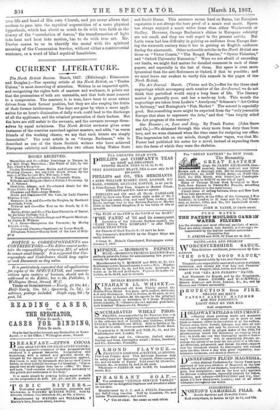CURRENT LITERATURE.
The North British Review. March, 1867. (Edinburgh : Edmonston and Douglas.)—The opening article of the North British, on "Trades Unions," is most deserving of attention. Written in an impartial spirit, and recognizing the rights both of masters and workmen, it points out that the pretensions of both are untenable, and that both must consent to a compromise. The masters, it is true, have been to some extent driven from their former position, but they are also reaping the fruits of their former intolerance. The days are gone by when a mere appli- cation for an hour's diminution of daily work could lead to the discharge of all the applicants, and the criminal prosecution of their leaders. But the laws are still unfair to the servants, and the servants revenge them- selves by equal unfairness. The North British reviewer gives some instances of the coercion exercised against masters, and adds, "as warm friends of the working classes, we say that such letters are simply lamentable." The next article is on "George Buchanan," who is described as one of the three Scottish writers who have achieved European celebrity and influence, the two others being Walter Scott
and David Hume. This sentence seems hard on Burns, but European reputation is not always the beat proof of a man's real merit. Byron. has always enjoyed a much wider fame than either Wordsworth or Shelley. However, George Buchanan's claims to European celebrity are not small, and they are well urged in the present article. But Latin verse had less difficulty in gaining an audience from Europe dur- ing the sixteenth century than it has in gaining an English audience during the nineteenth. Other noticeable articles in the North British are those on "Victor Cousin," "The Bengal Famine," "Oyster Fisheries," and "Oxford University Extension." Were we not afraid of exceeding our limits, we might find matter for detailed comment in each of these- papers, and especially in the last of them. But space is even more tyrannical than the anti-Reformers at Oxford, if that be possible ; and we must leave our readers to verify this remark in the pages of the. North British.






























 Previous page
Previous page